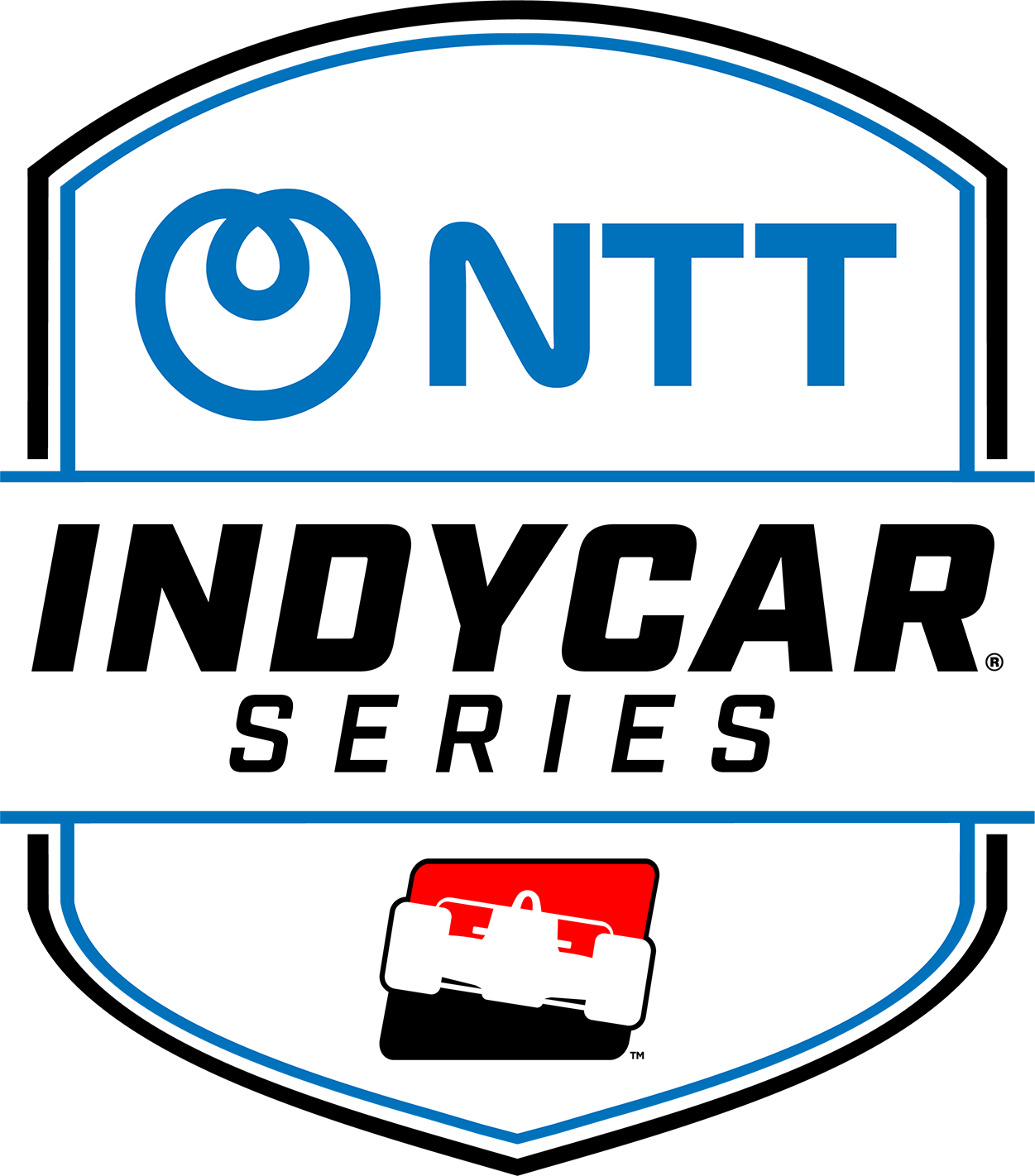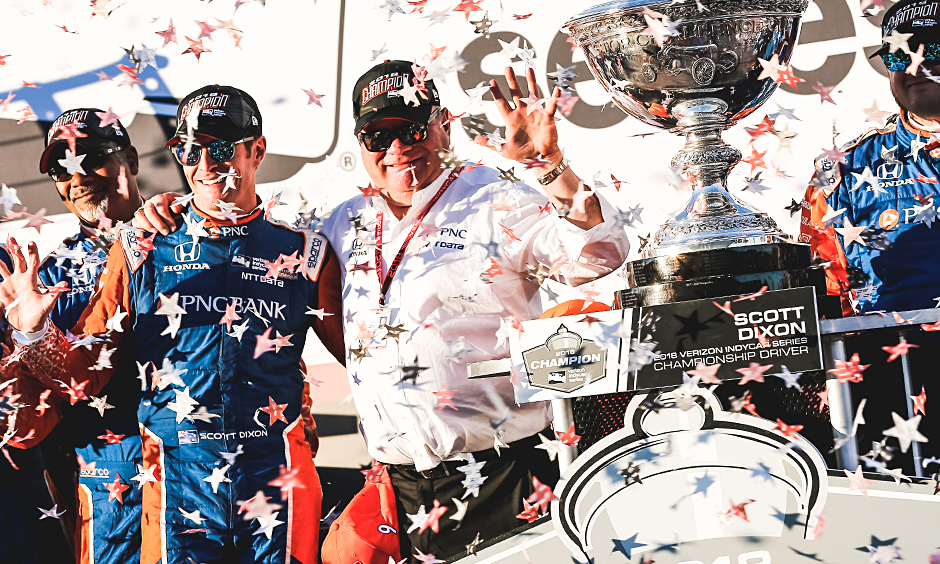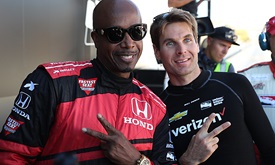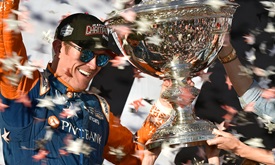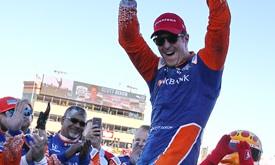Dixon puts another stamp on legacy with fifth INDYCAR championship
SEP 17, 2018
SONOMA, California – As Scott Dixon’s car came to a stop in the pits following Sunday’s INDYCAR Grand Prix of Sonoma, Chip Ganassi moved through a crowd of well-wishers and photographers to get close enough to talk to his driver.
“I’m not sure what I said,” Ganassi said. “I’m not the most esoteric person you’ve ever met in your life.”
Dixon had just put a bow on his fifth Verizon IndyCar Series championship, sealing his legacy as the best of his era and one of the best in racing history. Ganassi, his team owner, enjoyed it almost as much as his driver. Minutes after congratulating Dixon, Ganassi was crowd-surfing as the trophy presentation began.
Considering the historical significance of Dixon’s achievement, jubilation wasn’t just acceptable. It was necessary for two longtime partners and friends.
“When I look back at the first time I ever met Chip to where it is today and what his team has achieved, I’m a very small piece in that whole wheelhouse of what’s going on at Chip Ganassi Racing,” Dixon said. “I feel very lucky to work with the people that I do. Chip goes out there and gets the people that get the job done. There have been years where we’ve struggled and haven’t had the results that we’ve had, but Chip’s got a big heart. He can come across harsh and brash, but he’s always been a good friend of mine.”
Dixon finished second in Sunday’s race, five positions ahead of his closest challenger, Alexander Rossi, who roared back from contact and an unexpected pit stop early in the race. Dixon’s final total was 57 points ahead of Rossi and 98 points ahead of Will Power, who finished third in both the race and point standings.
The result was another championship to go with those won in 2003, 2008, 2013 and 2015, breaking a tie with Dario Franchitti, Mario Andretti and Sebastien Bourdais and putting Dixon alone in second, trailing only A.J. Foyt’s seven championships.
Even near the end of Sunday’s race, Dixon wasn’t certain about his chances to nail down the championship.
“It’s so weird,” Dixon said. “You kind of always doubt the situation that you’re in, or at least I have, and there have been years when we’ve lost championships to sometimes silly things or sometimes where we just haven’t executed well. The whole race I was just thinking about things that were out of our control or cautions that were going to flip the field, and none of that happened.”
As Dixon and Ganassi celebrated, Franchitti spoke of Dixon’s ability to adjust to changes around him and a yearning to constantly improve his craft.
“He’s a chameleon,” said Franchitti, Dixon’s former teammate and a team adviser with Chip Ganassi Racing. “He adapts to different styles of cars and different styles of tires. He learns from every teammate he’s got. He uses every resource he can get, and he’ll ask questions of them. You see the results.”
Ryan Hunter-Reay, who won the race ahead of Dixon, Power, Simon Pagenaud and Marco Andretti, praised Dixon afterward.
“To do that in this era of racing with reliability the way it is, the evenness and competitiveness of teams, is unbelievable,” Hunter-Reay said. “It's unthinkable what he's accomplished. It's amazing to think of what he's accomplished. It's great to share the track with him. Even better to beat him at times.”
Dixon benefitted from his closest competitor’s early trouble. Rossi tangled with teammate Andretti on the first lap, forcing the No. 27 NAPA AUTO PARTS Andretti Autosport Honda to the pits to replace a flat right front tire and front wing.
“You have to be able to make lemonade out of lemons sometimes,” Rossi said. “Unfortunately, we've had to do that a couple times this year. That's the way it goes. To win a championship, you’ve got to have excellent days all the time. I'm sure Scott is more than capable of doing the same thing. Fortunately for him, he was never in the position that he needed to. Now he's won five championships. Yeah, pretty hard to beat.”
Dixon won three races this season – the first race of the Detroit doubleheader, Texas and Toronto – and finished on the podium at five others. But a crucial moment Sept. 2 at Portland, when Dixon kept the No. 9 PNC Bank Chip Ganassi Racing Honda running when he was collected in a multicar crash on the opening lap, may have been the most significant.
“There were key races throughout the season,” Dixon said. “Portland was huge for us as far as luck and being able to come out of that pileup. … Texas and Toronto and different places we won this year. They all make a difference, right? It’s what makes a championship. But Portland to me was a difference-maker. When that dust cleared and I could see I still had four wheels on the car and the engine was running, I was like, ‘Hmmm. I can drive away again.’”
Skills like that are well-known to the people who work with Dixon daily. CGR managing director and race strategist Mike Hull said Dixon’s ability to get the most out of every situation is perhaps his most valuable skill.
“He understands what he has to do, and he understands the art of recovery extremely well,” Hull said. “He doesn’t give up and we don’t give up. There are times when we’ve left the racetrack knowing we could have done better than we did, but we accept the reality of what happened. It was hard to race the kind of race we did today.”
But Dixon adapted and made the most of the situation. It’s something he’s been doing for 18 Indy car seasons after winning the 2000 Indy Lights championship, each year marked by improvement.
“Talent only gets you so far,” Franchitti said. “He’s got lots of it, maybe more than I’ve ever raced against. That’s saying a lot with some of the people I’ve raced against. He just keeps working at it. That desire is exceptional.”
